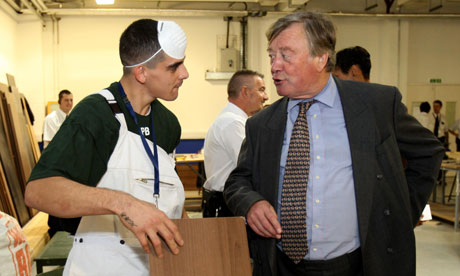Ken Clarke to unveil plans for prisoners to work 40-hour week
![]()
Ken Clarke to unveil plans for prisoners to work 40-hour week
Justice secretary to end enforced idleness in jails with some of cash earned going to victims
Alan Travis

Most prisoners will be expected to work a full 40-hour week instead of spending their days in enforced idleness in cells, under plans to be unveiled by the justice secretary, Ken Clarke, today. It will be made easier for prison governors to bring private companies into jails to employ prisoners in regular nine to five jobs in the hope of instilling a regime of hard work.
Part of the cash prisoners earn would go to their victims, part to the prisoner’s family to reduce their dependency on benefits, and they will keep part themselves. Ministers are also exploring deducting the cost of the prisoners’ board and lodging.
Justice ministry officials are considering whether prisoners could put their remaining wages into a pot to which they would gain access if they stayed out of trouble for two years after leaving jail.
Clarke hopes the scheme will turn prisons into places of “purposeful hard work” and ensure inmates make some restitution to their victims.
The Ministry of Justice intends to enact the dormant 1996 Prisoners’ Earnings Act so prisoners can be paid more than the current average of £8 a week. At present the minority of prisoners who work in jail are paid “cash in hand” without taxes or national insurance. They are employed on jobs such as repairing shoes and furniture, and inputting data. One women’s prison formerly had a contract for making pizzas.
Governors cannot force prisoners to work, but they can use a regime of incentives and privileges to reward those who do.
Under the scheme, private companies will be encouraged to provide work at the national minimum wage, so as not to undercut local labour, and preferably in areas of labour shortages.
Ministers also want to pilot one large-scale working prison in which private sector employers might pay higher wages, as part of a commercially viable industrial model to raise money for victim support.
“I want to revive a policy of John Major’s last Conservative government and make deductions from the earnings of working prisoners to provide compensation for victims of crime,” Clarke is to tell the Conservative party conference today.
“In order to raise those funds, we need to instil in our jails a regime of hard work. Most prisoners lead a life of enforced, bored idleness, where getting out of bed is optional.” Clarke wants to reduce the chances of prisoners committing further crimes when they get out.
“We have to try to get these people who have the backbone, to go straight. To handle life without crime when they have finished their punishment.”
He will cite successful examples including a shoe repair contract for Timpsons, a family firm of Edward Timpson, the Conservative MP for Crewe and Nantwich, as well as data-inputting work. He will also highlight the work of the National Grid and Cisco Systems, who offer training and the prospect of a job. Clarke hopes a push to get private firms involved will help get most prisoners employed.
Prison industries have always been a feature of life in jails in England and Wales, but companies have found it difficult to make an economic rate of return from prison labour. Much of the work that traditionally goes on inside prison contributes directly to the running of the jail, such as laundry, kitchen, and farm work. The last mailbag sewn in prison was more than 30 years ago.
The scheme has been welcomed by Frances Crook of the Howard League for Penal Reform, whose plans to get prisoners into a pilot scheme to work and pay taxes has previously been blocked by the prison service.
• Helen Newlove, the widow of murder victim Gary Newlove, is to be named today as a government adviser on anti-social behaviour. She will be a “champion for safer communities,” visiting communities blighted by anti-social behaviour.
Related Articles
The Mandela Years in Power
![]()
Did He Jump or Was He Pushed? In one of the last public photos released of Nelson Mandela (29 April
Egypt PM appoints new key ministers
![]()
Foreign affairs, interior and justice portfolios change hands amid violence outside state security buildings in Cairo Activists say they were
El gobierno de Obama apunta a Rusia y China
![]()
¿Puede sobrevivir el mundo a la ciega arrogancia de Washington? Paul Craig Roberts Global Research Traducido del inglés para Rebelión


